Overview
This article presents a compelling overview of innovative business ideas for wineries aimed at enhancing sales and fostering customer loyalty. Strategies such as:
- Establishing wine subscription services
- Leveraging social media marketing
- Hosting wine tasting events
are not just suggestions; they are essential tactics in today’s competitive landscape. Evidence supports that direct engagement with consumers through personalized experiences and unique offerings can significantly increase customer retention and drive revenue growth in the wine market. By adopting these strategies, wineries can position themselves for success while building lasting relationships with their customers.
Introduction
The wine industry is evolving rapidly, with family-owned vineyards actively seeking innovative ways to connect with consumers and boost sales. By exploring effective business ideas, wineries can unlock new revenue streams and foster lasting customer loyalty, particularly in a landscape where direct-to-consumer strategies are becoming increasingly vital.
How can wineries not only survive but thrive amidst fierce competition and changing consumer preferences? This article delves into ten impactful wine business ideas that promise to enhance customer engagement and drive sustainable growth.
Enocap: Transformative DTC Strategies for Family-Owned Wineries
Enocap excels in developing transformative direct-to-consumer (DTC) strategies that empower family-owned vineyards to forge significant relationships with their clients. Our comprehensive advisory services are designed to drive DTC growth, enhance brand narratives, and secure strategic capital, ensuring that businesses thrive for generations. By harnessing data-driven insights, Enocap enables wine producers to establish robust sales channels that not only drive revenue growth but also cultivate enduring customer relationships.
In 2025, vineyards that effectively implemented DTC strategies reported an average order value increase of 13%, underscoring the financial benefits of direct consumer engagement. This approach is crucial in a competitive landscape, where through personalized outreach can significantly enhance sales performance.
As vineyards increasingly adopt innovative DTC sales channels—such as SMS marketing and segmented email campaigns—they witness substantial improvements in customer retention and engagement. Furthermore, collaborating with research institutions allows vineyards to stay updated on advancements and best practices, while logistics innovations enhance fulfillment speed and efficiency, positioning them for sustainable growth in the evolving market.
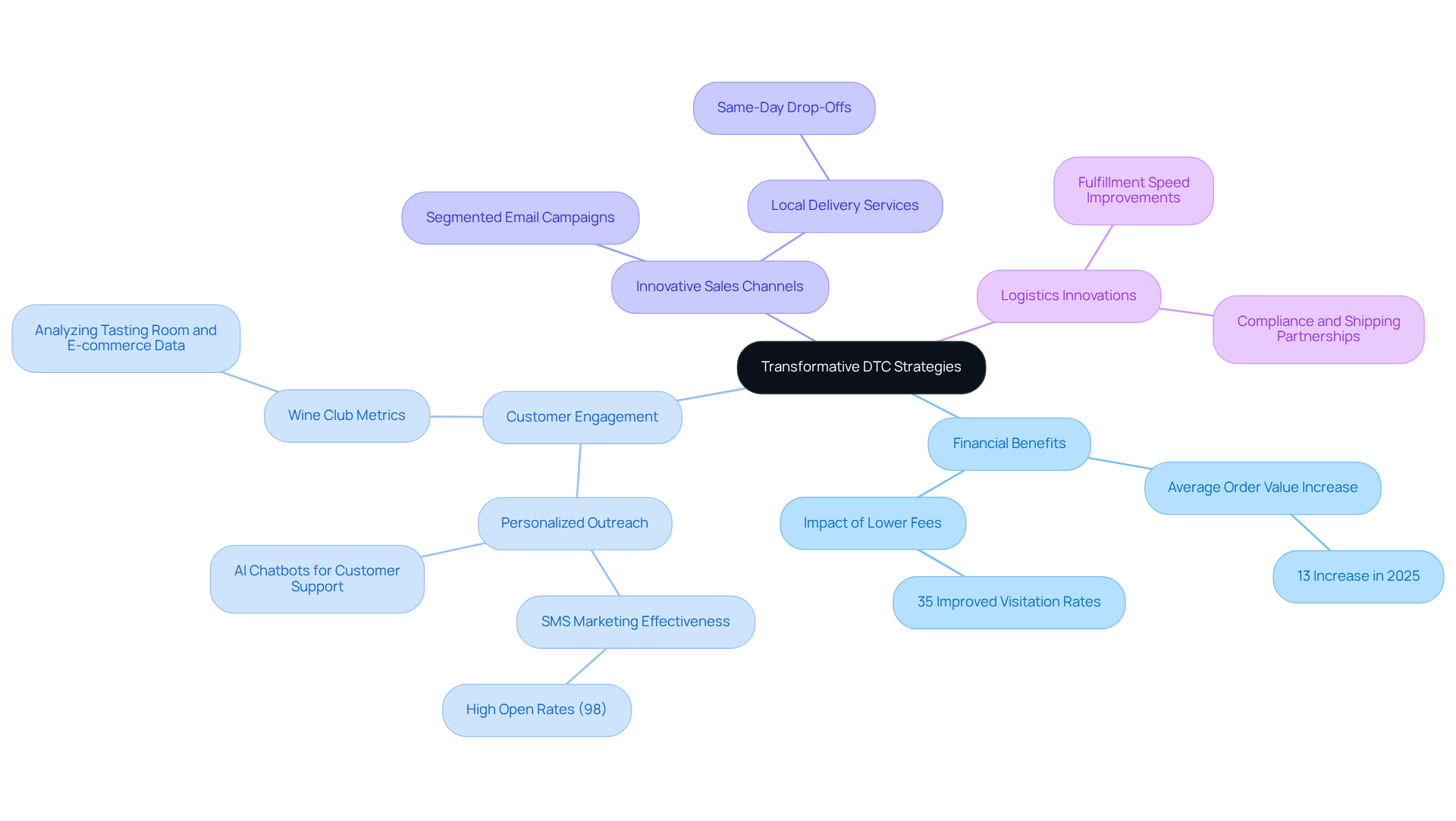
Wine Subscription Service: Boost Customer Loyalty and Revenue
Establishing a beverage subscription service presents a transformative opportunity for family-owned vineyards to develop unique wine business ideas. By implementing wine business ideas that involve offering curated collections of wines delivered regularly, producers can significantly enhance client loyalty and secure stable direct-to-consumer (DTC) revenue sources. This model not only keeps customers engaged but also allows producers to highlight their unique offerings and that resonate with consumers, fostering a deeper connection.
Moreover, by leveraging proven strategies to convert casual buyers into devoted club members, vineyards can create sustainable DTC channels that facilitate consistent growth in their wine business ideas. Enocap's expertise in strategic capital planning further bolsters these initiatives, ensuring that family-owned vineyards thrive for generations to come.
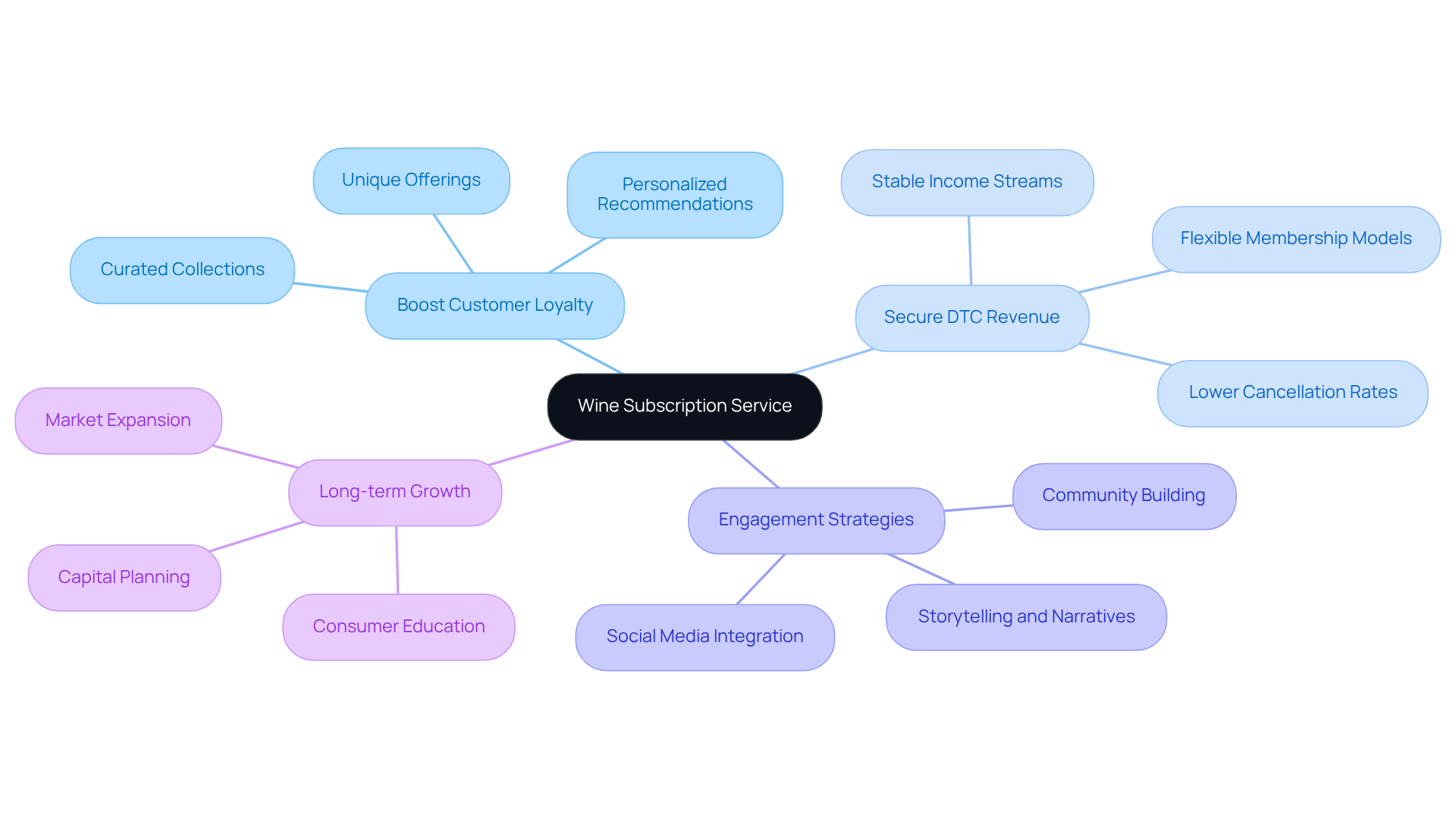
Social Media Marketing: Engage Customers and Build Brand Awareness
Leveraging social media platforms empowers wine producers to engage directly with consumers, share their unique narratives, and promote their products with efficacy. By crafting visually appealing content and dynamic campaigns, vineyards can transform occasional buyers into loyal club members, thereby enhancing brand loyalty and recognition.
Regular updates, behind-the-scenes glimpses, and foster a sense of community and connection with the brand. Moreover, integrating strategic capital planning into these social media efforts ensures that vineyards secure the necessary resources for sustainable growth.
Proven strategies, such as targeted advertising and personalized communication, further bolster direct-to-consumer channels, driving consistent engagement and loyalty.
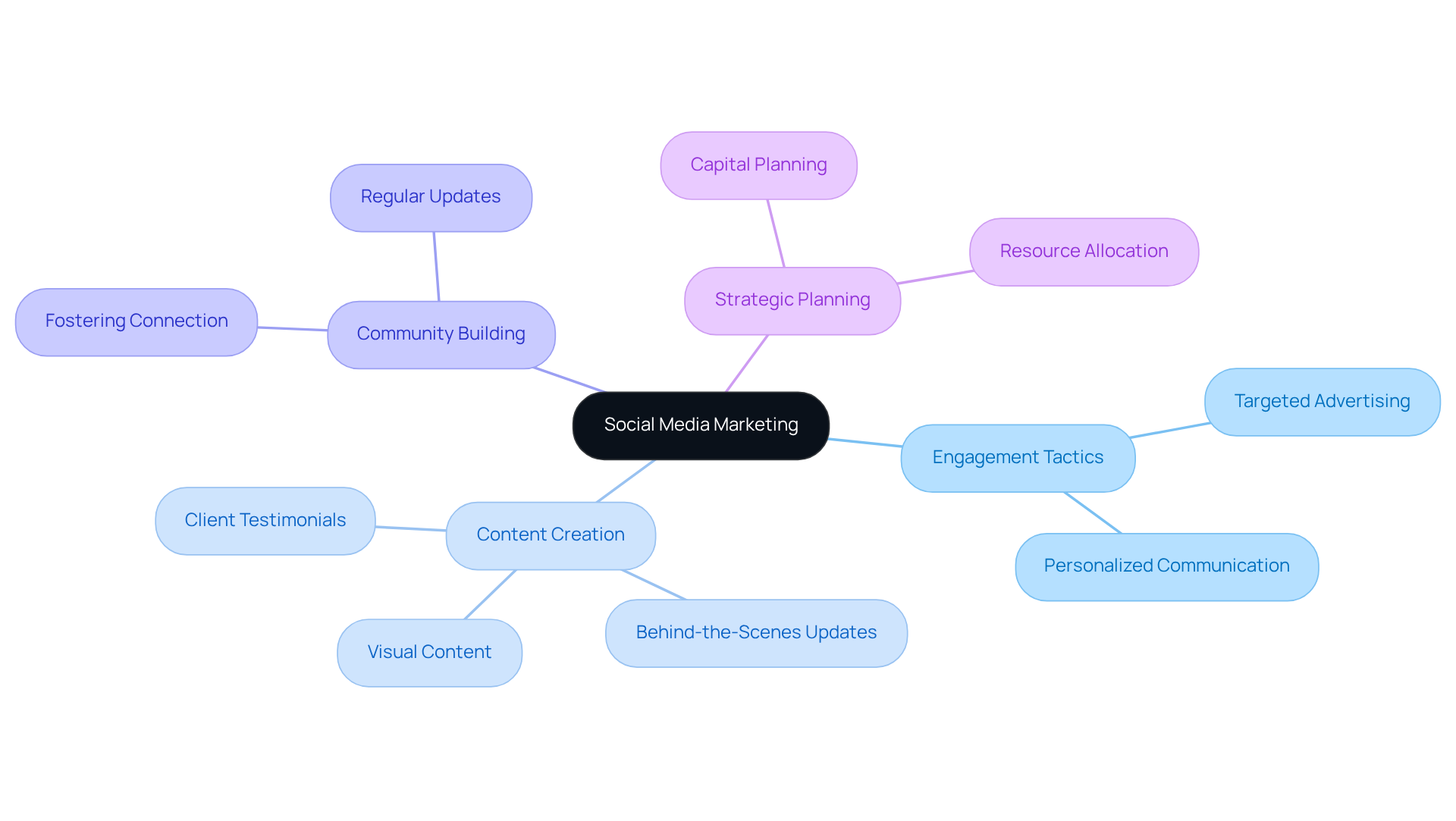
Wine Tasting Events: Create Memorable Customer Experiences
Organizing wine tasting events serves as a powerful strategy for vineyards to craft unforgettable experiences that resonate with patrons. These events provide a platform to showcase the establishment's distinct offerings while allowing consumers to engage with the brand in a personal environment. By weaving storytelling and educational elements into the tasting experience, wineries can deepen appreciation for their products and effectively transform casual buyers into loyal club members. This method not only cultivates a sense of community among beverage enthusiasts but also aligns with for sustainable growth.
Research indicates that 59% of consumers report increased brand loyalty after participating in exclusive experiences, underscoring the impact of well-executed wine tastings on customer retention. By prioritizing these events, vineyards can enhance client loyalty and drive consistent growth.
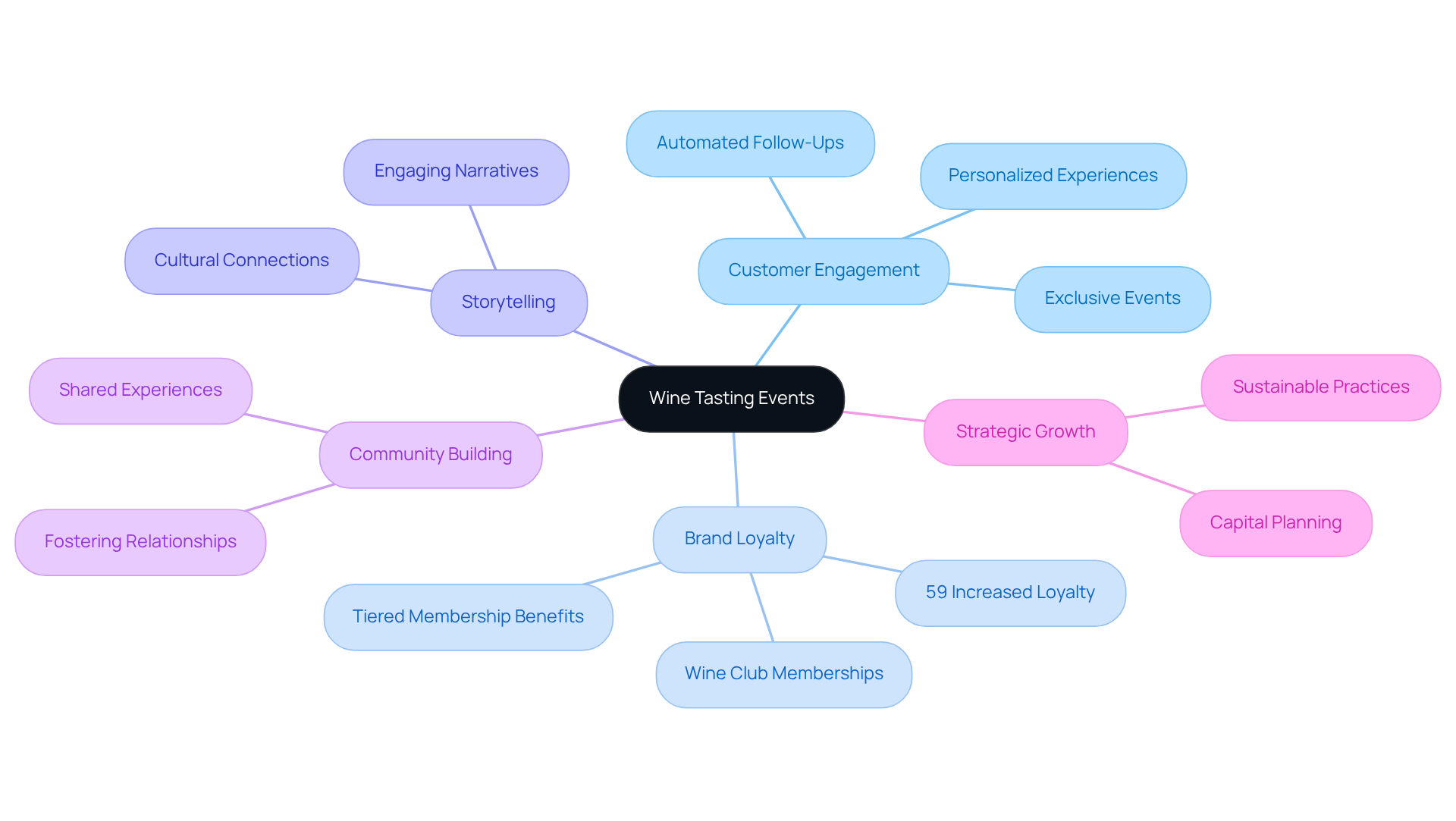
Wine-Themed Merchandise: Diversify Revenue and Enhance Brand Identity
Offering wine-themed merchandise, such as branded glasses, apparel, and accessories, is one of the wine business ideas that presents a strategic opportunity for wineries to diversify their revenue streams and enhance their direct-to-consumer channels. This approach not only generates additional income but also strengthens company identity, creating a tangible connection for customers. Merchandise acts as a powerful marketing tool, extending brand awareness beyond the tasting room and into everyday life.
For instance, research from Denbies indicates that non-wine products can represent up to 35% of gift shop sales in vineyards, underscoring their potential influence on total revenue. Furthermore, U.S. tasting rooms target 10% of their monthly sales from non-wine merchandise, highlighting the significance of diversifying revenue streams through merchandise. Wineries that effectively integrate merchandise into their offerings can , which aligns with various wine business ideas that encourage repeat visits and foster loyalty.
As Adam Scheid, Chief Operating Officer of The Brandsmen, asserts, 'Merchandise will not sell simply because it features your vineyard’s logo on it.' It will move if the item is useful, entertaining, socially valuable, and part of a larger shopping experience. Jeanette Simpson, COO, adds, 'We do a wide range of wine-related accessories and little objects of desire to encourage secondary spend.'
By thoughtfully curating merchandise that resonates with their audience, producers can boost sales and explore various wine business ideas to cultivate a lasting brand presence in the market, ultimately transforming casual buyers into loyal club members.
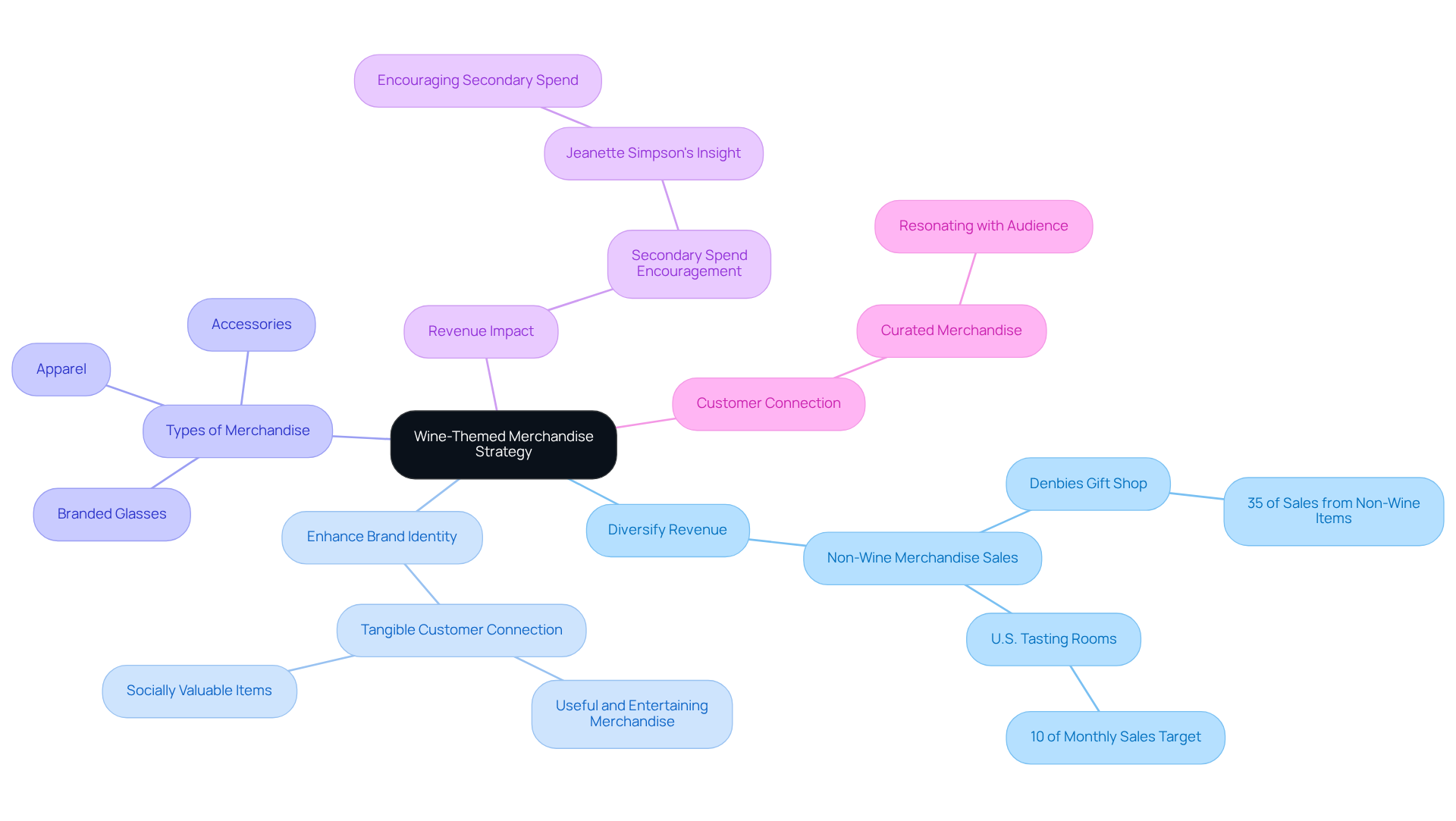
Online Wine Education: Attract New Customers and Build Authority
Developing online beverage education programs, such as webinars or classes, serves as a strategic initiative to attract new clients and position your establishment as a leader in the industry. By disseminating knowledge about beverage production, tasting techniques, and food pairings, vintners can effectively engage consumers, fostering a profound appreciation for their offerings. This educational approach not only cultivates trust but also inspires clients to return, transforming occasional buyers into . By implementing these direct-to-consumer strategies, producers can achieve consistent growth and enhance their narrative, ultimately solidifying their presence in the competitive beverage market.
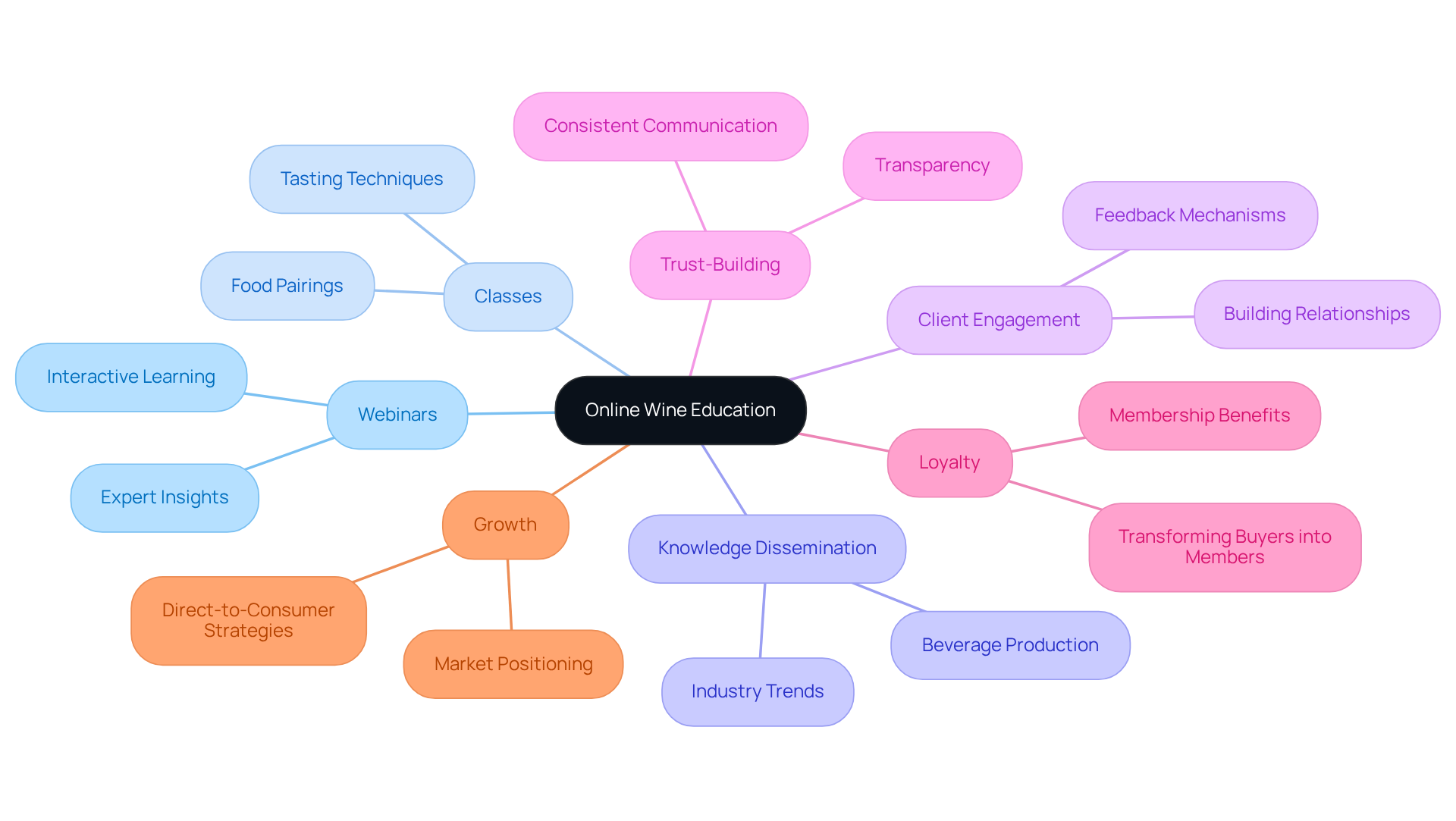
Restaurant Collaborations: Enhance Brand Exposure and Create Unique Experiences
Collaborating with local restaurants significantly enhances visibility and crafts unique dining experiences for customers, aligning seamlessly with Enocap's transformative direct-to-consumer strategies. By featuring beverages on restaurant menus or organizing special pairing events, producers can effectively showcase their products to new audiences.
For instance, establishments that incorporate wine-and-food pairing suggestions have witnessed wine sales soar by 30-50%, illustrating the powerful impact of strategic partnerships and storytelling. These collaborations not only boost visibility but also forge that inspire patrons to reach out to the vineyard directly.
Engaging in such partnerships allows vineyards to explore wine business ideas by tapping into the restaurant's clientele, creating a mutually beneficial scenario that fosters brand loyalty and drives sales. Furthermore, sharing success stories from these collaborations can galvanize further customer and employee involvement, reinforcing the establishment's commitment to quality and community while promoting sustainable growth.
Strategic capital planning can also play a crucial role in maximizing the benefits of these partnerships, ensuring that vineyards are well-positioned to seize the opportunities presented by increased demand.
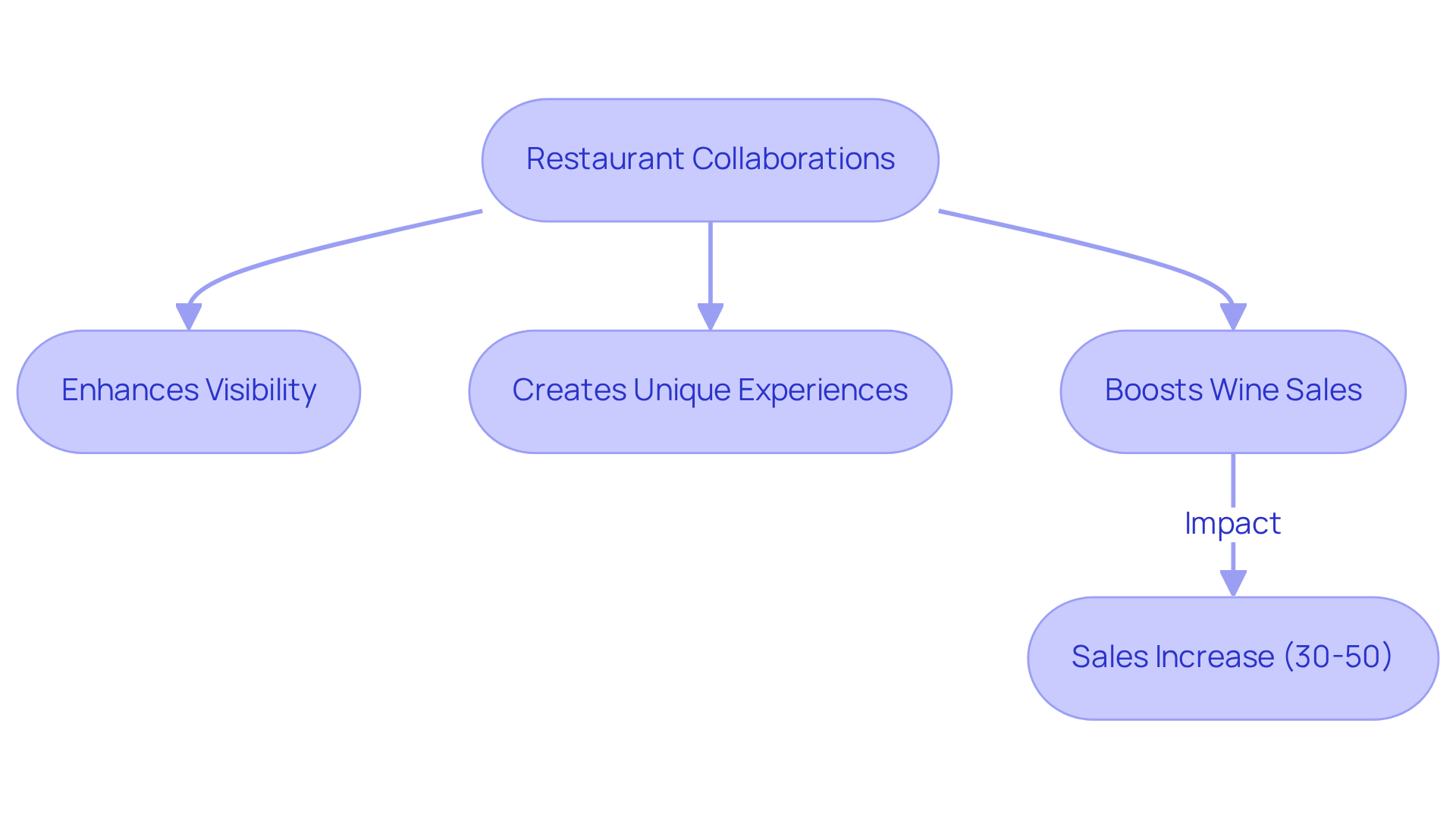
Sustainable Vineyard Practices: Appeal to Eco-Conscious Consumers
Adopting sustainable vineyard practices is not just beneficial; it is essential for appealing to eco-conscious consumers and enhancing direct-to-consumer (DTC) revenue in various wine business ideas. By implementing organic farming techniques, minimizing waste, and fostering biodiversity, wineries can develop effective wine business ideas that significantly enhance their reputation. This commitment to sustainability resonates with a growing demographic that prioritizes environmental responsibility in their purchasing decisions, potentially leading to new wine business ideas. In fact, promoting these eco-friendly initiatives effectively can further strengthen relationships with consumers, as 74% are more inclined to trust companies that highlight their environmental impact.
Moreover, 66.11% of consumers believe that supporting small-scale farmers is a key advantage of selecting sustainably produced beverages, which can inspire various wine business ideas. As younger generations increasingly seek brands that align with their values, it is noteworthy that 60% of multicultural individuals aged 20 to 40 prefer organic or certified sustainable beverages, highlighting potential wine business ideas. Establishments that embrace sustainability can generate innovative wine business ideas, attracting new patrons while also fostering loyalty among current ones.
To maximize the impact of these efforts, wine producers should consider into their wine business ideas and marketing strategies. By highlighting their sustainable practices and the positive impact on local communities, they can transform casual buyers into loyal club members, which aligns with their wine business ideas. This approach not only engages consumers but also reinforces the winery's commitment to sustainability, ultimately driving growth in wine business ideas in an increasingly competitive market.
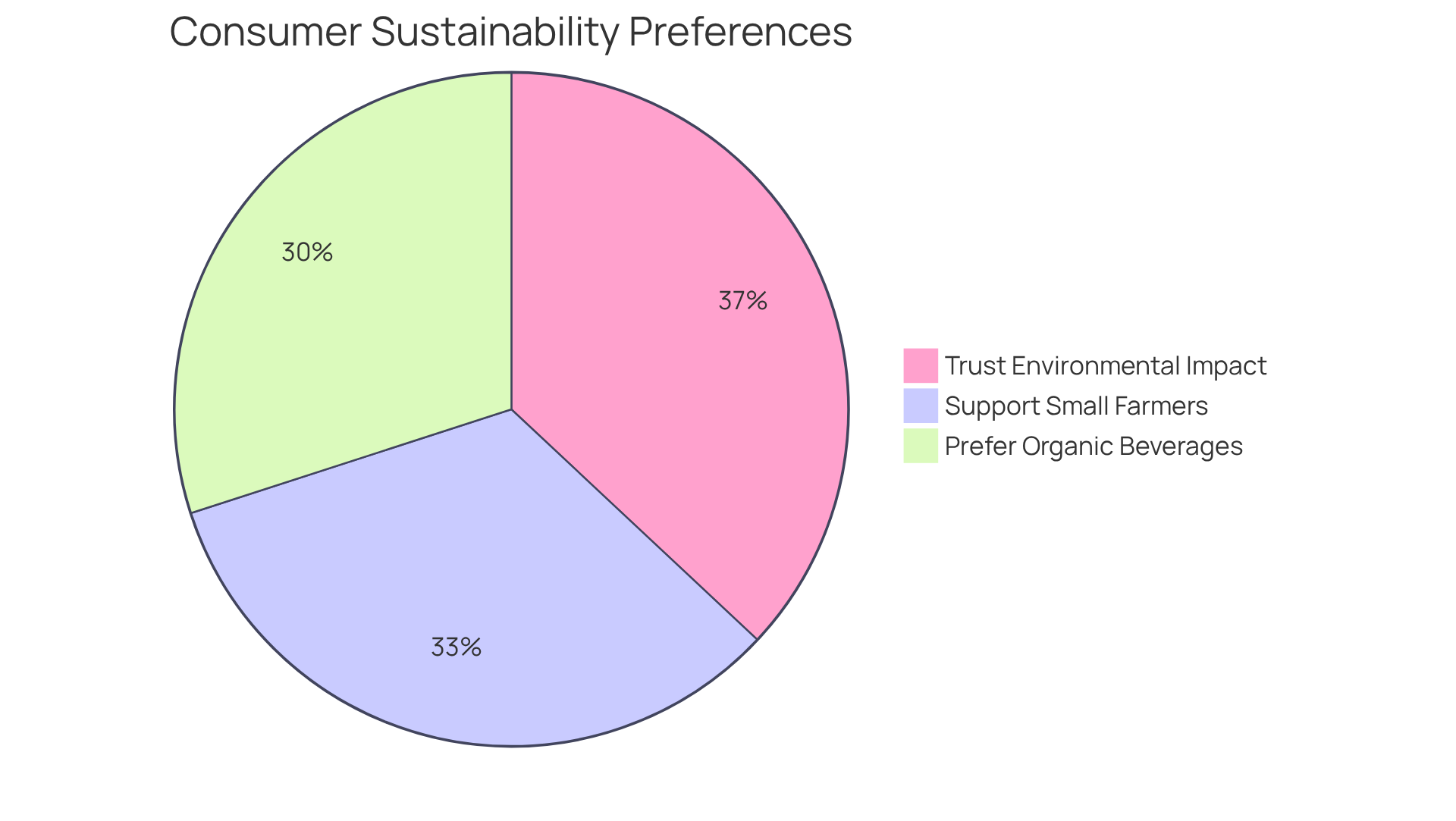
Exclusive Wine Club: Foster Loyalty and Ensure Steady Revenue
Establishing a unique wine club is one of the effective wine business ideas for nurturing client loyalty and ensuring a stable revenue stream. By offering members distinctive advantages such as exclusive releases, special occasions, and tailored experiences, vineyards can cultivate a sense of belonging that drives repeat purchases. This exclusivity not only enhances visitor engagement but also fortifies the emotional bond between the winery and its supporters.
Proven strategies for scaling wine clubs include:
- Offering tiered membership levels
- Personalized communication
- Exclusive access to events
These approaches can transform casual buyers into loyal club members, thereby driving consistent growth in direct-to-consumer revenue. Notably, enhancing retention rates by just 5% can lead to profit increases ranging from 25% to 95%, underscoring the financial benefits of a loyal clientele.
As the subscription economy is projected to expand significantly, reaching $996 billion by 2024, producers who adapt to these trends can position themselves advantageously in the market. By focusing on crafting unforgettable experiences and emotional connections through their clubs, wineries can implement innovative wine business ideas to secure consistent income while bolstering client loyalty.
Additionally, it is vital to recognize that acquiring a new customer can be up to five times more costly than retaining an existing one, emphasizing the critical importance of loyalty in a competitive landscape. To maximize the effectiveness of your wine club, consider implementing regular with members to continuously enhance their experience.
Furthermore, Enocap's strategic capital advisory services can assist family-owned vineyards in unlocking growth opportunities through tailored debt, equity, and acquisition solutions, further strengthening their DTC strategies.
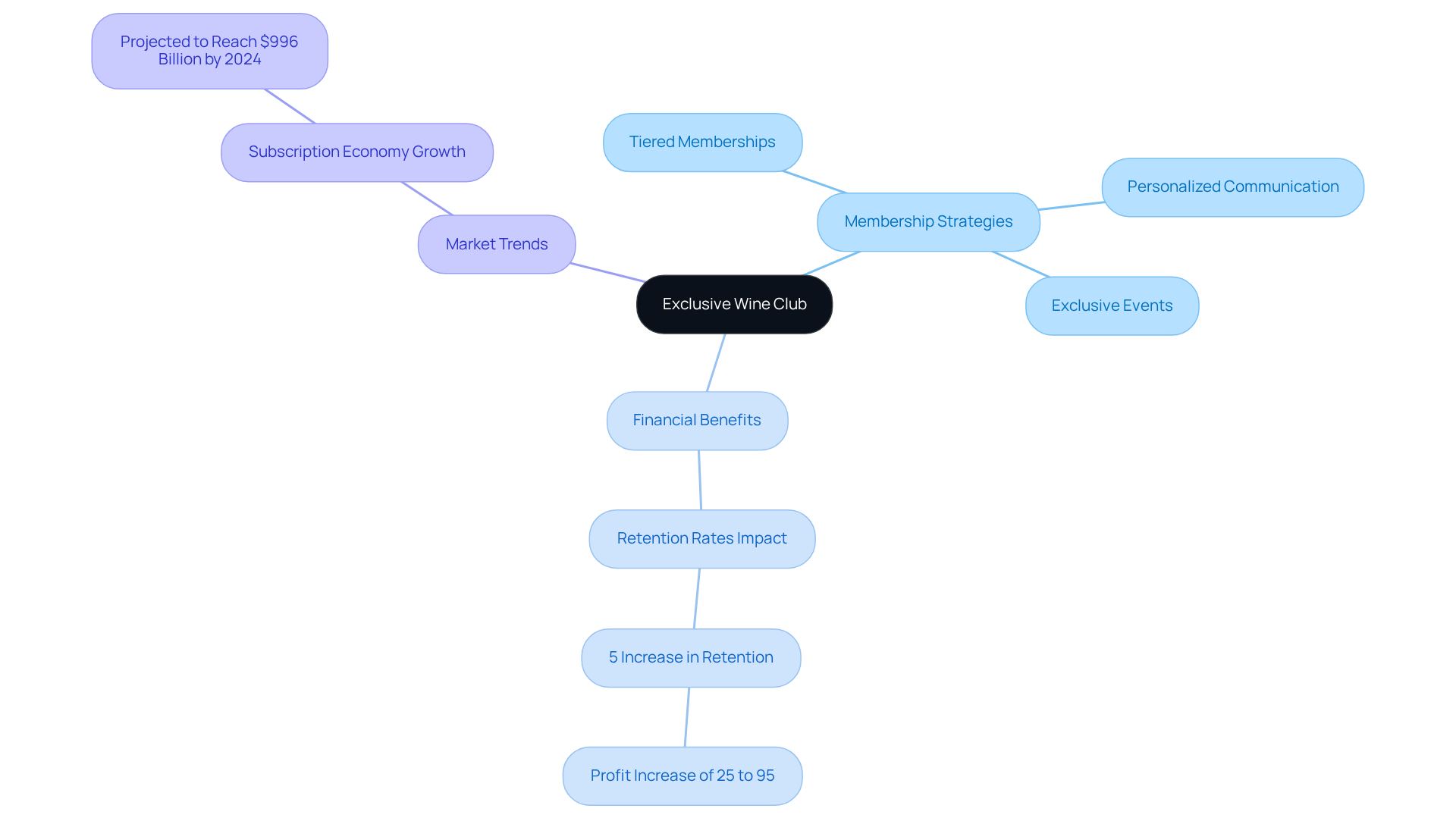
Innovative Packaging Solutions: Enhance Product Appeal and Customer Experience
Investing in innovative packaging solutions significantly enhances product appeal and elevates the overall customer experience, particularly for family-owned businesses aiming to strengthen their direct-to-consumer strategies. Distinctive designs, sustainable materials, and informative labels not only set apart a vineyard's offerings in a competitive market but also connect with environmentally conscious consumers. Efficient packaging acts as a strong communication instrument, expressing the company's values and narrative, which is crucial in contemporary beverage marketing and storytelling.
With the expected to expand at an annual rate of roughly 5.48% and attain a size of about $5.6 billion in 2024, producers that emphasize careful packaging design can draw in consumers and cultivate loyalty. Moreover, packaging that incorporates easy-open features and resealable closures caters to consumer demands for convenience, further influencing purchasing decisions. As companies innovate in packaging, they create memorable unboxing experiences that enhance buyer satisfaction and encourage repeat purchases, solidifying their position in the market.
By aligning packaging innovations with direct-to-consumer strategies, wineries can effectively engage customers and enhance their overall brand narrative.
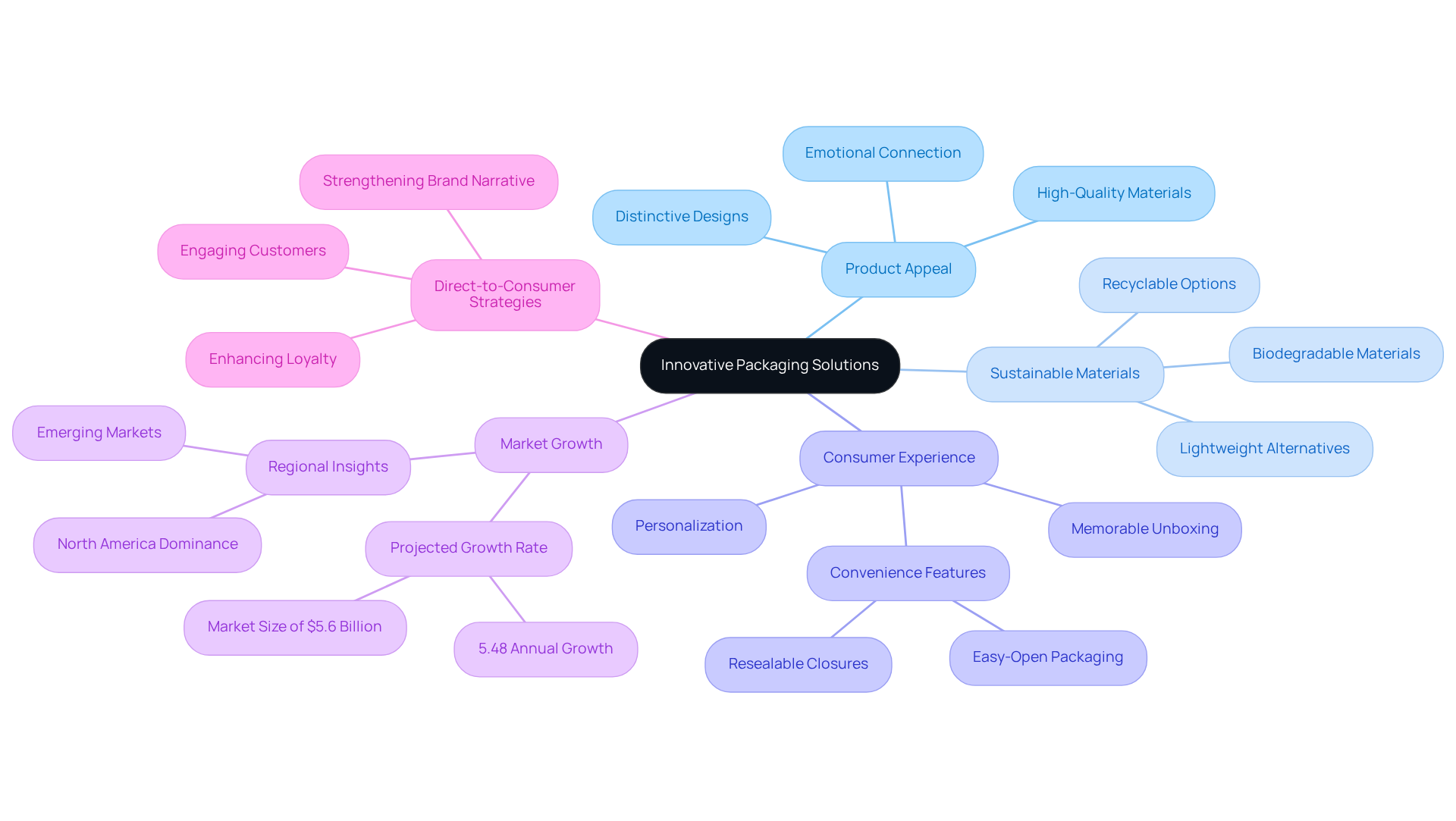
Conclusion
The exploration of innovative wine business ideas reveals a dynamic landscape where family-owned wineries can thrive through strategic direct-to-consumer (DTC) initiatives. By embracing various approaches—such as personalized customer engagement, subscription services, and sustainable practices—vineyards can significantly boost sales while cultivating lasting relationships with their clientele. The emphasis on storytelling, experiential marketing, and community involvement serves as a foundation for building brand loyalty and enhancing customer experiences.
Key strategies such as:
- Leveraging social media for brand awareness
- Organizing memorable wine tasting events
- Offering exclusive wine clubs
are essential components for success. Furthermore, the integration of innovative packaging solutions and wine-themed merchandise presents opportunities for diversification and revenue growth. Each of these elements contributes to a comprehensive approach that aligns with current trends, ultimately positioning wineries for sustainable success in a competitive market.
As the wine industry continues to evolve, the importance of adapting to consumer preferences and market demands cannot be overstated. Wineries are encouraged to explore these transformative ideas, implement effective DTC strategies, and foster connections with their customers. By doing so, they can ensure not only their survival but also their flourishing in an ever-changing landscape, ultimately securing a loyal customer base for years to come.
Frequently Asked Questions
What is Enocap and what services does it provide?
Enocap specializes in developing transformative direct-to-consumer (DTC) strategies for family-owned vineyards, offering comprehensive advisory services that drive DTC growth, enhance brand narratives, and secure strategic capital.
How do DTC strategies benefit family-owned vineyards?
DTC strategies empower vineyards to forge significant relationships with clients, increase average order values, enhance customer retention, and improve overall sales performance by fostering brand loyalty through personalized outreach.
What financial impact did DTC strategies have on vineyards in 2025?
Vineyards that effectively implemented DTC strategies in 2025 reported an average order value increase of 13%, highlighting the financial benefits of direct consumer engagement.
What innovative sales channels are being adopted by vineyards?
Vineyards are increasingly adopting innovative DTC sales channels such as SMS marketing and segmented email campaigns, which lead to substantial improvements in customer retention and engagement.
How can wine subscription services enhance customer loyalty?
Wine subscription services allow family-owned vineyards to offer curated collections of wines delivered regularly, significantly enhancing client loyalty and securing stable DTC revenue sources.
What role does social media marketing play for wine producers?
Social media marketing enables wine producers to engage directly with consumers, share unique narratives, promote products effectively, and enhance brand loyalty through visually appealing content and dynamic campaigns.
How can wineries convert casual buyers into loyal club members?
By leveraging proven strategies and offering unique wine business ideas, vineyards can convert casual buyers into devoted club members, creating sustainable DTC channels for consistent growth.
What strategies can vineyards use to ensure sustainable growth?
Vineyards can integrate strategic capital planning into their DTC efforts, utilize targeted advertising, personalized communication, and maintain regular updates on social media to secure resources and drive consistent engagement and loyalty.




